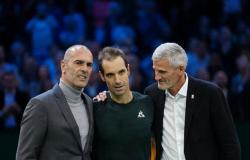This evening the Palace; tomorrow the planet. Whatever Luke Littler achieves in darts, fame or world peace, nothing will ever match the crystalline beauty of that moment.
World champion for the first time, the culmination and realization of a dream which – if you think about it – has not really been in the making for that long. Such a violent and spectacular rise simply deserved a triumph to match, and by beating Michael van Gerwen by seven sets to three, Littler could well have demolished not only one of the greatest players in history, but an entire era . Darts, a game designed in a pub, may well have been perfected in a teenager’s bedroom.
Littler has been 17 again for a few weeks. What makes it so good? A solid foundation, economical and repeatable action, the kind of foolproof precision on the double 10 that would probably qualify it for a medical license. The ability to slide the darts over or under their predecessors, so a bed is never truly blocked. This is what you can see.
But there are also things that one can only really guess at: the aura, the swagger, a flair and flamboyance that simply demands that you drop everything and watch. The courage needed to score 25 out of 45 doubles in a world final. And perhaps the fact that he knows so little about the world beyond darts also works in his favor, giving him a clarity of thought and singularity of purpose that his older rivals often need. a certain degree of lubrication to reproduce.
The world will soon be rattling its windows: looking for gossip, demanding of one’s time, exploiting one’s name for clicks. That’s simply the price you pay for prime-time genius. Phil Taylor and Van Gerwen, his predecessors at the top of the sport, commanded grudging respect. Littler, by contrast, inspires a kind of instinctive fascination: part animal magnetism, part museum curiosity.
Comparisons to other teenage prodigies are obviously inevitable. But she’s not Emma Raducanu, because Littler is really, really good. It’s not Lionel Messi or Tiger Woods, because everyone could see them becoming a giant from a young age. This is not some weird Olympic gymnast or swimmer benefiting from an industrial training system and quite possibly a state-run doping regime.
Simply put, Littler is basically your worst nightmare: like Taylor, if Taylor was 30 years younger, less weird, and spent almost his entire childhood watching WWE and YouTube. A kid with the ability to come up with 180s out of nowhere and at the most inconvenient times. The ability to expand the board for himself and shrink it for his opponent, forcing him to hit 12-dart legs just to keep in place.
And here Van Gerwen was simply sucked into the current. He lost by 25 innings to 14, not to score – which was pretty even – but to finish, where he only double-checked 37% of his doubles. By the end, the three-time world champion barely bothered to celebrate his legs, no longer pumping out his own 180s, stepping forward to retrieve his darts as if it were merely an administrative obligation, like retrieving the received after a credit card transaction. .
And for those of you who didn’t follow the sport back in the day, a few years ago this guy was basically unbeatable. He scored the loudest, finished the deadliest, celebrated the loudest.
In 2016–17, he won nine of ten major titles and reached the final in the other. And the pride is still there. But for all his great performances at this tournament, the high performance is not.
We got a taste of this less than a minute into the match, when Van Gerwen spun a flamboyant 180 to find himself at 25. It was a calculated compromise, rejecting the percentage setup (tripled 19 to leave the double 14) in favor of dopamine reaches the maximum. But if you want to smooth out, you better not miss your next 25th visit. And then two more are missing for the leg. Littler broke, served the entire set and despite a pretty bad start by his standards, he was out.
after newsletter promotion
By the fourth set, Littler had lodged himself firmly and rentlessly between the Dutchman’s ears. Van Gerwen was looking for the kind of strange numbers – triple 20 of 74, refusing 18 of 128 – that betrayed utter confusion, an attempt to change vibrations from a sheer inability to change anything else. Littler, meanwhile, was still averaging under 100. He had hit under 180. He was also up 4-0.
Overcoming greatness is hard enough on its own: it’s harder when you give greatness a four-set head start. There were some fleeting glimpses of challenge: a 132 from Van Gerwen to crush the fifth set, immediately snuffed out in the next set by Littler, who began his three winning rounds with 180s. Van Gerwen reduced the gap to 5-2, then 6-3, but with all the conviction of a man who lost everything in a storm as he reassuringly tapped the coins in his pocket.
The end would soon come. And the tears too: for all his laser-guided genius on the board, he’s still a child, with childish feelings, for whom it’s his whole world.
And the palace rose towards him, and the noise grew louder, and the tears flowed, and suddenly the walls were collapsing on top of each other, from one world to another . The end of it all and the beginning of everything else.






